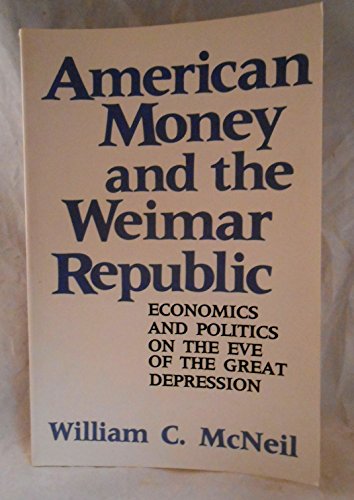American Money and the Weimer Republic: Economics and Politics on the Eve of the Great Depression (Political Economy of International Change)


sku: COM9780231062374NEW
ACCORDING TO OUR RECORDS THIS PRODUCT IS NOT AVAILABLE NOW
$39.92
Shipping from: Canada
Description
Excerpts from Introduction: By 1924, a decade of war, revolution, and hyper-inflation had destroyed Germany's once strong capital market. What little money was available commanded real interest rates in the range of 50 percent per year. Germans looked to New York to relieve this financial pressure. Between 1925 and 1930 American private bankers lent nearly three billion dollars to German borrowers - over twice the $1.3 billion Germany received from the United States under the Marshal Plan after World War II. In both Germany and the United State, the loans became critical tools in efforts to define a broad range of international and domestic policy options. For the United States, the foreign lending that emerged in the 1920s represented America's first use of the financial power it had won n the first World War. But how would the new world power use its wealth? Revisionist historians writing in the 1950s and 60s concluded that America used its power to dominate the world economy in the service of narrow business self-interests. More recently, a more sympathetic consensus has formed Among American historian who agree that the United States was indeed active in European affairs but argue that American policy was formulated to help stabilize European economies, not exploit them.
Customers also viewed

$25.88
OLEVS Men's Watches Waterproof Original Brand Calendar Quartz Watch for Male Luminous Trend Fashion Authentication Wristwatch
aliexpress.com
$33.15
2024 New Couture Women's Slim Shoulderless Sleeveless Waistcoat Fashion High Waist Loose Casual Dress Pants
aliexpress.com
$3.46
2 шт., пульт дистанционного управления для воздухоочистителя Dyson Pure Cool Link DP01 DP03 TP02 TP03
aliexpress.com
$27.87
Wood Grain Controller Housing with Full Set Buttons DIY Replacement Shell Case for Nintendo Switch Joy-Con Back Plate NS
aliexpress.com
$17.23
Floral Chiffon Flared Sleeve Dress Female 2023 Summer New Loose Temperament V-Neck Lace-up Waist Slimming Age-reducing Skirt X11
aliexpress.com
$11.37
Visual Doorbell Remote Smart Home Intercom Video Wired Night Vision Abs Office White Outfit
aliexpress.com
$22.55
Soda Water Adapter, Soda Machine Quick Connector Aluminum CO2 Refill Adapter with Release Valve Pressure Gauge
aliexpress.com
$10.84
1 Set of Thicken Heat Diffuser Electric Gas Stove Induction Plate Cooktop Heat Induction Plate
aliexpress.com
$18.00
Silicone Mold Enclosure Potted Plant DIY Resin Keychain Pendant Epoxy Resin For Jewelry Making Tools Handmade Craft C126
aliexpress.com
$15.26
13 Pcs Egg Tart Molds, 3Inch Mini Tart Pans Removable Bottom, Cupcake Cake Muffin Mold Tin Pan Baking Tool
aliexpress.com
$16.42
Shower Head With Hose High Pressure 5 Functions Water Spray Shower Head Detachable Shower Head Handheld Showers With ON/OFF
aliexpress.com
$26.09
Дизайнерская сумка, кошельки, новинка, женская сумка Daifei, сумки через плечо для женщин, выбор Интернета
aliexpress.com
$9.69
Pink White Wing Angel Princess Baby Portrait Vinyl Photography Backdrop Photographic Background For Photo Studio Photophone Prop
aliexpress.com
$12.42
50/100/1000 шт. Ntag213 NFC Стикеры мокрой инкрустация NTAG 213 NFC теги универсальные этикетки 20*10 мм для всех NFC телефонов с поддержкой
aliexpress.ru
$10.99
Мужские кожаные перчатки, черные теплые перчатки с пальцами для сенсорного экрана, Осень-зима
aliexpress.ru
$0.88
1pc New colorful mini cartoon alpaca sailboat print tin box sealed jar packing boxes jewelry candy box small storage boxes
aliexpress.com
$4.82
Metal Jet Metal Gas Lighter Firepower Two Torch Lighter Visible Gas Capacity For Cigar Pipe Powerful Windproof Gadgets For Man
aliexpress.com
$511.10
rechargeable 12V 100Ah lithium Iron Phosphate battery pack LiFePO4 Battery ABS Case solar energy storage
aliexpress.com
$7.27
500pcs/roll Star Love Reflective Sticker Round Labels Envelope Thanks Packing Gift Stationery Seal Decorative Paper Paste Tool
aliexpress.com
$11.34
Kids Dresses For Girls Short Sleeve Children Clothing Sequins Stars Tutu Girl Casual School Wear Princess Party Sequin Skirt Set
aliexpress.com
$8.98
Genuine Leather Cowhide Cover Case For Samsung Galaxy S21 Ultra S20 FE S8 S9 S10 S21 Plus Note 20 10 A51 A71 A31 A50 M21 M31 M51
aliexpress.com
$0.77
1pc 10m rose gold colorful ribbon suitable balloon suit with birthday party wedding wedding decoration small baloon ribbon
aliexpress.com
$39.99
CL03B682KQ3NNNC CL03B682KQ3NNNH CL03B682KP3NNNC CL03B682KP3NNNH 0201/0603 6.8NF 682K 10% 10V 6.3V SMD capacitor
aliexpress.com
$2,303.04
electric recliner relax theater living room Sofa bed 3 seat functional genuine leather couch Nordic Cinema door to door delivery
aliexpress.com
$36.37
jackets girls boys coat jacket plus velvet thicken 2021 army green warm winter outerwear christmas gift cotton fleece kids children's c, Blue;gray
dhgate.com
$7.44
Футболка прямого кроя ( Бирюзовый) LOLOCLO, Футболка прямого кроя (2 Бирюзовый) LOLOCLO
loloclo.ru
$30.80
Health 280Ml Hammered Glass Storage Jar Set Straight Bamboo Shelf Seasoning Box Kitchen Salt Sugar Seasoning Bottle Tools
aliexpress.com
$12.34
Children's little doctor toy dentist stethoscope injection medical box set play house toy gift
aliexpress.com
$60.78
New Manual Rivet Tool Suit Professional Rivet Nut Thread Locator Nut Metric System Riveting With Carbon steel arm Easy To Use
aliexpress.com
$2.94
Wind Up Bath Toy Cute Swimming Girl Bath Toys For Toddlers 1-3 Floating Wind Up Toys With Swimming Rings For New Born Baby
aliexpress.com
$2.21
Женская уникальная жемчужная резинка для волос, резинка для волос, прочная резинка для волос, эластичная Женская резинка для волос
aliexpress.com
$22.86
Alternate Navy Washington Capitals Jersey Hockey 8 Alex Ovechkin 77 TJ Oshie Tom Wilson Evgeny Kuznetsov 74 John Carlson 35 Henrik Lundqvist, Black;red
dhgate.com
$86.99
comfortable casual wool women's summer queen new arrival knitshoes candy color wee sandalias#53288888, Black
dhgate.com
$20.80
m6 multi-sided diamond mas stick yoga relaxation roller stick muscle roller tool for sports f qyldxc yhshop2010
dhgate.com
$13.06
2020 New Girls Flower Doll Collar Court Ribbon Bow Knot Sanding Knit Shirts Toddler Children Long Sleeve Casual Fashion Top Tees
aliexpress.com
$500.00
New Women's Faux Leather Sun flower Print Teardrop Women Fashion Jewelry Earrings For Girl
aliexpress.com








